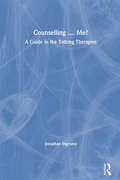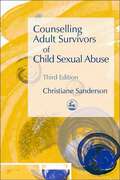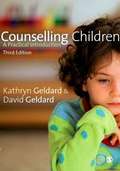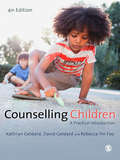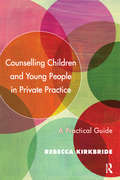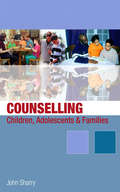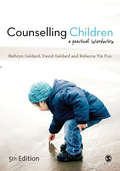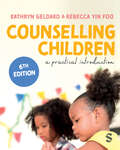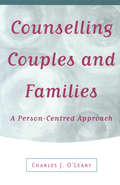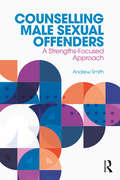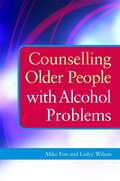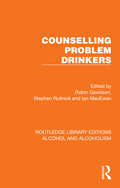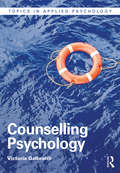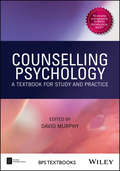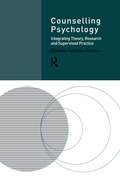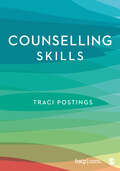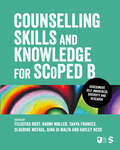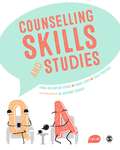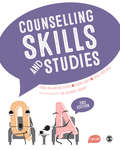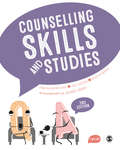- Table View
- List View
Counselling .... Me?: A Guide to the Talking Therapies
by Jonathan IngramsAlthough exact figures are hard to come by, statistical surveys suggest that as many as one in four of us in Britain suffer mental distress at some time in our lives. This is reflected in the increasing numbers who turn to counselling for help. But for the majority of people considering this approach there is the added concern of not knowing what they might be letting themselves in for. How does this form of therapy work, and why? How do they choose a counsellor? What qualifications should the therapist have? What happens in a counselling session? How long does it take? What sort of results can they expect? When does it end? Without knowing the answers to questions like these, going for counselling is a something of a leap into the unknown; not an ideal situation for someone who may already be under considerable stress. As a consequence, many who could benefit from counselling may hold back and so delay dealing with their difficulties.
Counselling Adolescents
by Kathryn Geldard David Geldard`This book would be a valuable resource for trainee counsellors. It would also serve to enhance the work of experienced practitioners, particularly if they are more familiar with counselling adults or children and would like to build on this by developing their skills with adolescents' - BACP North London Magazine This practical book has been specifically designed for students and professionals working with emotionally disturbed adolescents. It introduces the specific issues associated with counselling adolescents, and describes how traditional counselling skills can be enhanced by the use of pro-active processes for more effective use with this client group. Kathryn and David Geldard describe the nature of adolescence; explore adolescents' counselling needs, giving an account of the pro-active approach to counselling they developed for use with this client group; and describe the use of widely accepted counselling skills which enable the adolescent to arrive at strategies for addressing specific issues. The final part of the book contains case studies.
Counselling Adult Survivors of Child Sexual Abuse: Third Edition
by Christiane SandersonThis updated and expanded edition provides comprehensive coverage of the theory and practice of counselling survivors of child sexual abuse (CSA). In a reasoned and thoughtful approach, common stereotypes of abusers and their victims are replaced with current knowledge on the incidence of CSA and its long-term impacts on adult survivors. Christiane Sanderson explores the therapeutic relationship from building trust and meeting the client's needs to establishing boundaries, addressing transference issues and avoiding secondary traumatic stress. She evaluates various treatment approaches and techniques, and discusses the advantages and disadvantages of group therapy. Stand-alone chapters provide in-depth coverage of: * CSA's impact on survivors' sense of self and their relationships with others * self-harming behaviour, including self-injury, substance abuse and eating disorders * how memory is constructed and reconstructed, including the controversial issues surrounding recovered memories * useful approaches to coping with fear and loss from working with other types of trauma * normal sexual development and typical sexual difficulties for survivors * working with shame and dissociation. Counselling Adult Survivors of Child Sexual Abuse honestly addresses the complex issues in this important area of work. It provides practical strategies for those new to counselling in this field and valuable new insights for experienced counsellors.
Counselling Children
by Kathryn Geldard David Geldard`This is a book I would not be without and I suggest that all counsellors working with children should have it on their bookshelf - Emotional & Behavioural Difficulties `This book is clearly written and well organized text living up to its claims of being jargon-free. Good practice is stressed throughout, and I found it an easily read, interesting book which should appeal to interested practitioners from a variety of backgrounds. It could easily be described as a working handbook. Making it a useful addition to those considering counselling children'' - The Lecturer `If you only buy one book about counselling children - this is the one to buy. It is thorough, practical and easy to read. The main theoretical model used involves enabling the child to tell her/his story, and there are many practical suggestions about how to do this. The authors suggest ways to use different media and recommend which media are suitable for different ages of children. In addition to providing a framework for working with children, this is a useful handbook to refer to again and again. I highly recommend it'' `This book is straightforward and realistic in its suggested approach to working with children. The format and style make it easy to read and refer to. All sections are clear and enable the practitioner to incorporate the suggestions into a comprehensive approach to working with children and their families. A recommended read'' Amazon Reviews `[Counselling Children] goes on to cover just about all of the approaches the counsellor is going to need in dealing with families and individuals'' - Gerald Haigh, Times Educational Supplement `Counselling Childrenis a comprehensive guide for those interested in working therapeutically with children… the authors have combined clinical insight with a wealth of imaginative ideas, enabling counsellors to provide child-clients with tools to express themselves in their own terms. Its use of an interrogative writing style keeps the reader engaged, while its simplification of complex ideas and clarity of layout and language make it an indispensable reference book'' - Ashley Goff, Counselling Psychology Review Counselling Children, Second Edition is used on a wide range of training courses for those preparing to work with children. It is an excellent source of practical ideas and resources - including over 30 photocopiable worksheets. TO VIEW SAMPLE PHOTOCOPIABLE WORKSHEETS PLEASE CLICK HERE ---------------------------------------------------- Counselling Children is a highly acclaimed, introductory guide to counselling children and to the practical issues of communicating with children in a counselling context. In this, the Second Edition, Kathryn Geldard and David Geldard relate the theory and practice of counselling children in a highly accessible, practical and jargon-free style. Now including two new chapters, Counselling Children: - teaches specific counselling skills for use with children, illustrated with carefully chosen case examples - sets out a new model for counselling children which sequentially integrates ideas from a number of therapeutic approaches - provides advice on how to select and use a range of media, activities and play when counselling children - gives guidance on the benefits and practicalities of combining individual work with children and family therapy - includes worksheets to use when helping children in specific areas such as developing self-esteem and managing emotions. Counselling Children is an invaluable resource for students and professionals in many fields including counselling, social work, psychology, occupational therapy, mental health, nursing and education.
Counselling Children
by Kathryn Geldard David Geldard Rebecca Yin Foo'This book is a must have for anyone training to work with children. It combines theory, research-based strategies and direct experience to create a practical, accessible and thoughtful guide. New counsellors will no doubt continue to refer to the book's suggested strategies and media for years to come.' Dr Samantha Bursnall, Clinical Psychologist, Department of Child and Family, Tavistock Centre, London This fourth edition of bestselling Counselling Children is a highly practical guide to the skills and strategies which can be used in working with children who are experiencing emotional problems. The authors cover: -The goals for counselling children and the counsellor-child relationship -Practice frameworks for working effectively with children -Play therapy and using different media and activities -Building self esteem and social skills using worksheets. This fully revised fourth edition includes a new chapter on Ethical Considerations; a new chapter covering Historical Background and Contemporary Ideas, helping you understand and demonstrate the evidence base for your practice; and lots more case studies to help you develop appropriate techniques across different settings and at different stages of your practice. The book is invaluable in the practical skills training of counsellors, psychologists, social workers, occupational therapists, nurses, teachers, and other professionals who work with children. Dr Kathryn Geldard is adjunct senior lecturer at the University of the Sunshine Coast, Australia. David Geldard has an international reputation as a psychologist and trainer of counsellors. He is noted for his work in counselling children and their families. Rebecca Yin Foo is an educational and developmental psychologist who specializes in working with children and families in her private practice.
Counselling Children and Young People in Private Practice: A Practical Guide
by Rebecca KirkbrideWith statutory CAMHS services often heavily oversubscribed, and school and college services mainly offering brief therapeutic interventions, parents are increasingly turning to private practitioners for therapy for their children when they need expert emotional or psychological support. Working privately with children and families can be a rewarding experience for counsellors and psychotherapists but it can also be fraught with concerns for both practitioners and families alike. These concerns can seem so daunting that therapists with clinical experience of therapy with children continue to limit themselves to working only in education or statutory settings. This book offers comprehensive guidance to both experienced and novice counsellors to assist them in the process of setting up or adapting their private practice to include children and young people. It coherently and systematically addresses the obstacles which stand in the way of practitioners offering this important service effectively and ethically. The book is divided into four parts and uses case material to bring to life the areas covered by each chapter.
Counselling Children, Adolescents and Families: A Strengths-Based Approach
by Dr John Sharry`I recommend this book to anyone who lives or works with families, children or teenagers' - Nurturing Potential `This is a valuable book, worth attention in every child and family service. My own agency has ordered a copy!' - Robert Cumming, Nurturing Potential `John Sharry's book is a jewel in the solution-focused literature. It is clearly and engagingly written, draws on a host of ideas from different therapeutic approaches and is packed with practical examples. There is no better book on strengths-based therapy with children and adolescents. Every team should have one' - Chris Iveson, Brief Therapy Practice Counselling Children, Adolescents and Families describes an innovative approach to therapeutic work which builds on the strengths of children and their parents. As the author's experience shows, helping clients to focus on potential solutions rather than problems can be a powerful means of engaging them in the therapeutic process, even in the most conflicting family circumstances. Harnessing the client's personal, family and community resources in this way also helps counteract their feelings of powerlessness and the possibility of increasing reliance on professional services. Part One outlines the basic principles of a solution-focused and strengths-based approach, tackling such thorny issues as how and when to use diagnosis. Part two describes creative applications of the approach, using groupwork, play-based activities and video feedback. Part Three, examines practical issues which arise in more 'difficult' cases, such as child abuse and suicidal teenagers and children. This book is aimed at professionals and trainees in fields including social work, mental health, childcare, education, psychotherapy and counselling.
Counselling Children: A Practical Introduction
by Kathryn Geldard David Geldard Rebecca Yin FooThe definitive guide to the skills and techniques used when working with children experiencing emotional problems, this book covers all you need to know about: The goals for counselling children and the child-counsellor relationship Practice frameworks for working effectively with children Play therapy and the use of different media and activities Building self-esteem and social skills through the use of worksheets. This fifth edition has been updated to include: A new chapter on technology; its influence on children and ways that technology can be used during counselling New content on issues of diversity and difference in counselling children The different contexts in which counselling children occur Discussion of concepts of wellbeing and resilience Updated references and research. The book is supported by a new companion website that provides training materials and handouts on a range of skills for counselling children including: helping the child to tell their story sand tray work, the use of miniature animals, the use of clay, and helping the child to change thoughts and behaviour. This highly practical guide is vital reading for counsellors, psychologists, social workers, occupational therapists, nurses and teachers working or training to work with children.
Counselling Children: A Practical Introduction
by Kathryn Geldard David Geldard Rebecca Yin FooThe definitive guide to the skills and techniques used when working with children experiencing emotional problems, this book covers all you need to know about: The goals for counselling children and the child-counsellor relationship Practice frameworks for working effectively with children Play therapy and the use of different media and activities Building self-esteem and social skills through the use of worksheets. This fifth edition has been updated to include: A new chapter on technology; its influence on children and ways that technology can be used during counselling New content on issues of diversity and difference in counselling children The different contexts in which counselling children occur Discussion of concepts of wellbeing and resilience Updated references and research. The book is supported by a new companion website that provides training materials and handouts on a range of skills for counselling children including: helping the child to tell their story sand tray work, the use of miniature animals, the use of clay, and helping the child to change thoughts and behaviour. This highly practical guide is vital reading for counsellors, psychologists, social workers, occupational therapists, nurses and teachers working or training to work with children.
Counselling Children: A Practical Introduction
by Kathryn Geldard Rebecca Yin FooThe definitive guide to the skills, techniques, and concepts used when working with children experiencing emotional challenges. It covers all you need to know about: · The child-counsellor relationship · Practice frameworks for working effectively · Play therapy and the use of different media and activities · Building self-esteem and social skills through the use of worksheets · The concepts of wellbeing and resilience. New to this edition: · Technology: its influence on children and ways it can be used in counselling · Counselling in a post-pandemic world and the role of remote counselling and ‘telehealth’ · More discussion of issues of diversity, difference, intersectionality, implicit bias, and an inclusive practice · Updated case studies to affirm diversity and represent wider populace · Expanded and updated end of chapter further resources · Updated conclusion (with reflections on the pandemic) · Greater focus on inclusive practice and how SPICC model can be applied across various social/cultural groups. Online resources include digital picture books, worksheets and a list of further reading to support your professional practice and help you extend your learning. This highly practical guide is a vital resource for counsellors, psychologists, social workers, occupational therapists, nurses, and teachers working or training to work with children.
Counselling Children: A Practical Introduction
by Kathryn Geldard Rebecca Yin FooThe definitive guide to the skills, techniques, and concepts used when working with children experiencing emotional challenges. It covers all you need to know about: · The child-counsellor relationship · Practice frameworks for working effectively · Play therapy and the use of different media and activities · Building self-esteem and social skills through the use of worksheets · The concepts of wellbeing and resilience. New to this edition: · Technology: its influence on children and ways it can be used in counselling · Counselling in a post-pandemic world and the role of remote counselling and ‘telehealth’ · More discussion of issues of diversity, difference, intersectionality, implicit bias, and an inclusive practice · Updated case studies to affirm diversity and represent wider populace · Expanded and updated end of chapter further resources · Updated conclusion (with reflections on the pandemic) · Greater focus on inclusive practice and how SPICC model can be applied across various social/cultural groups. Online resources include digital picture books, worksheets and a list of further reading to support your professional practice and help you extend your learning. This highly practical guide is a vital resource for counsellors, psychologists, social workers, occupational therapists, nurses, and teachers working or training to work with children.
Counselling Couples and Families: A Person-Centred Approach
by Charles J O'LearyReader's comments: `Then along comes your book - lands on my desk like a gift, which I have barely put down since. It stopped me searching for external answers, helped me to dig into the knowledge, philosophy and way of working which already existed in me. I draw on it all the time for inspiration and a way of grounding me in the tentative moments of working towards a delicate connection with the families I encounter. I have a lot to be thankful to you for - I have now developed a way of working which seems helpful and which enables those around me to find a way forward, but perhaps most of all I finally feel comfortable and free to be the same counsellor I am with individuals - Hurrah!' - Kim Barber, Counsellor Lecturers' comments: 'A fascinating book which combines couple counselling with person-centred counselling. Will be recommended reading for social work students working with couple relationships' 'Very readible. Useful for students of counselling beyomd the 'title' focus of couples and families' `The only book on couple and family counselling from the person-centred approach' `This book is unique in its articulation of family therapy and the person-centred approach. It is also engaging in the way couples and the families come to life through Charlie O'Leary's acute and sensitive observation. It is an essential text in any person-centred therapy library'- Dave Mearns, University of Strathclyde `Compelling reading... I liked this book. It is intelligent, thought-provoking, occasionally funny and a delight to read. I warmed to the author's passion for the work of Carl Rogers.... All Relate counsellors will find something of value - even the strict psychodynamic practitioners' - Relate News `The author deserves congratulations on his easy, readable style. This will ensure that the book will be read, rather than simply browsed by many' - Sexual and Relationship Therapy `Provides a very good introduction for counsellors in working with families.' - British Journal of Guidance & Counselling `In this highly readable text, the theory and practice of counselling couples and families are successfully integrated with principles from the Rogerian/person-centred approach. In this sense the book is unique: although a lot of counsellors in fact practice relational therapy from a person-centred perspective, until now, no basic text was available in this field' - Alfons Vansteenwegen, INTAMS Review In this unique book, the theory and practice of counselling couples and families are integrated with principles from the person-centred approach. With numerous examples from actual sessions, the book clearly illustrates the key issues that couples and families face, and the ways in which the counsellor can help them to resolve these to their own satisfaction. Written primarily from the viewpoint of working with couples and families, issues specific to relational counselling are contrasted to those that arise when counselling individuals or non-related groups. The author then explores the process of relational counselling using the person-centred principles of empathy, congruence, unconditional positive regard and non-interference with the clients' actualizing tendency.
Counselling Male Sexual Offenders: A Strengths-Focused Approach
by Andrew SmithCounselling Male Sexual Offenders: A Strengths-Focused Approach informs readers how to utilize an easily accessible, integrative, strengths-focused counselling approach with men who pose a sexual risk. There is currently a scarcity of published material which teaches people in a practical way how to conduct one-to-one counselling with different sorts of male sex offenders. However, as the number of internet offenders increases exponentially and more historic abuse cases emerge, understanding and treating the phenomenon of sex offending can play a significant role in preventing sexual crime and reducing harm to victims. In addition to being a ‘how to do book’, in Counselling Male Sexual Offenders the author explores at depth the inner processes of counsellors working with this client group. It presents treatment formats and exercises for engaging individuals who deny and minimize harmful sexual behaviour. With illustrative case studies of various types of sex offenders – as well as statements from sex offenders and probation officers themselves – this text provides one of the most comprehensive insights available into the authentic experience of treating this population. Counselling Male Sexual Offenders will be of value to counsellors and psychotherapists, alongside other practitioners such as psychologists, social workers, probation officers, and support workers.
Counselling Older People with Alcohol Problems
by Mike Fox Lesley WilsonAlcohol misuse is becoming an increasingly significant issue for people aged 55 and over, and providing effective counselling services to this growing client group requires a unique and specialised approach. This practical guide explores the factors that differentiate older drinkers, and introduces an innovative person-centred model that will help counsellors and other healthcare professionals to give older people with alcohol problems the help and support they need. Older people with alcohol problems often have complex personal histories, and are particularly vulnerable to long-term dependency, social isolation and self-medication. This book explores the influences, patterns and triggers that affect the development and progression of alcohol dependency in this age group, and provides a detailed description of a theoretical model and therapeutic process that has proved successful in practice. Informative case studies demonstrate the approach in action and guidance is also given for working with clients with dementia or mental health problems. This book will prove an invaluable resource for counsellors and other healthcare professionals who encounter alcohol problems in their clinical practice, including clinical psychologists, social workers, occupational therapists and community psychiatric nurses.
Counselling Problem Drinkers (Routledge Library Editions: Alcohol and Alcoholism)
by Robin DavidsonHow far should counselling be tailored to an individual’s needs? What intervention is most effective for which kind of problem drinker? How can the counsellor successfully guide the client through the process of deciding to change? Originally published in 1991, Counselling Problem Drinkers provides an illuminating and invaluable guide for the counsellor trying to help clients control their drinking. Written in a clear, straightforward way, it offers practical but imaginative advice, and places alcohol counselling firmly in context.
Counselling Psychology (Topics in Applied Psychology)
by Victoria GalbraithThis is the first textbook to provide a complete overview of counselling psychology. Covering not only the underlying principles and philosophy of the profession, it offers a uniquely applied perspective in a concise, student-friendly format. From the relationship between research and practice to key ethical and professional issues, the book is written by some of the most eminent academic and practising psychologists in the field. It initially defines what counselling psychology and a therapeutic relationship involves, before outlining the range of approaches that can be taken with clients, from CBT to psychodynamic perspectives, and the journey of training through to working as a counselling psychologist. Supported by case studies and a range of features to illustrate how theory can be applied to practice, this is the ideal companion for courses in applied counselling psychology. The integrated and interactive approach covers the personal and professional issues which counselling psychologists face, making this the definitive introduction for any student of this growing field of study.
Counselling Psychology: A Textbook for Study and Practice (BPS Textbooks in Psychology)
by David MurphyA complete introduction to the theory and practice of contemporary counselling psychology An excellent resource for students at undergraduate or graduate level, Counselling Psychology: A Textbook for Study and Practice provides valuable insights into the key issues associated with theory and practice in this field. The contributors represent a diverse array of approaches, reflecting the rich diversity within the area, and care is taken to avoid favouring any one approach. The book begins with an overview of the historical and philosophical foundations of counselling psychology, before taking a detailed look at major therapeutic approaches and exploring issues associated with specific client populations, ethics, research design, and more. In particular, the text seeks to explain how counselling psychology differs from and informs other areas of contemporary applied psychology. The result is an engaging balance of the personal and academically rigorous, presented in a highly accessible format. • An authoritative introduction to and key issues involved with the theory and practice of counselling psychology for students and practitioners at all levels • Considers all major approaches to psychotherapy including existential, person-centered experiential, psychodynamic, and cognitive-behavioural • Explores issues commonly encountered when working with specific client groups including children, people with intellectual disabilities, and emergency trauma victims
Counselling Psychology: Integrating Theory, Research and Supervised Practice
by Petruska ClarksonCounselling psychology, a rapidly expanding mental health discipline, is rooted in academic psychology and therefore has unique potential of develop and sustain a powerful model for the integration of research and practice. This is the argument of this pioneering book, which brings together contributions from many leading counselling psychologists to show how practitioners are already working along these lines, and how the model can be developed for the future.The aim of the book is to bridge the divide between academic psychology and counselling practice and to encourage professionals to bring ethically aware and culturally sensitive research into the consulting room. It provides a secure grounding for trainees and an excellent resource for experience practitioners.Counselling Psychology:* defines and contextualizes the discipline* examines its potential for future development* shows how research integrated with supervised practice can be applied in professional settings.
Counselling Skills
by Traci PostingsThis counselling skills book will equip you with the necessary knowledge, skills and qualities to work with people in a range of different roles and settings. It defines counselling skills and introduces key skills including: listening and responding skills, empathy and different models, tools and techniques. Further chapters explore the importance of skills practice and self-awareness; ethics, boundaries and confidentiality; working remotely; working with difference and diversity, and different professional roles. Throughout, case studies show you how these skills can make a difference in practice, while exercises, including a student journal feature, help you reflect on your own attitudes to enhance your reflective practice. This book is an accessible guide to the BACP counselling skills competence framework for trainee counsellors and those using counselling skills as part of another professional role.
Counselling Skills
by Traci PostingsThis counselling skills book will equip you with the necessary knowledge, skills and qualities to work with people in a range of different roles and settings. It defines counselling skills and introduces key skills including: listening and responding skills, empathy and different models, tools and techniques. Further chapters explore the importance of skills practice and self-awareness; ethics, boundaries and confidentiality; working remotely; working with difference and diversity, and different professional roles. Throughout, case studies show you how these skills can make a difference in practice, while exercises, including a student journal feature, help you reflect on your own attitudes to enhance your reflective practice. This book is an accessible guide to the BACP counselling skills competence framework for trainee counsellors and those using counselling skills as part of another professional role.
Counselling Skills and Knowledge for SCoPEd B: Diversity, Self-awareness, Assessment and Research
by Naomi Moller Hayley Ness Tanya Frances Felicitas Rost Claudine McFaul Gina Di MaltaThis text supports you to develop the counselling competencies aligned to the SCoPEd framework professional standards in Column B. It covers key competencies in client assessment, self-awareness, and knowledge and skills, with chapters on topics such as online counselling, working with unconscious and out-of-awareness processes, foundations of psychological assessment and using reflexivity in practice. The book further emphasises the importance of research, with chapters on how to understand and evaluate quantitative and qualitative research and how both can enhance your practice. Throughout, the authors foreground diversity-informed and culturally sensitive ways of working, supporting you to adapt your skills and knowledge to meet your clients’ needs. Each chapter includes learning features such as practice-relevant examples, key definitions and opportunities for reflection, to support you on your learning and professional development journey.
Counselling Skills and Knowledge for SCoPEd B: Diversity, Self-awareness, Assessment and Research
by Naomi Moller Hayley Ness Tanya Frances Felicitas Rost Claudine McFaul Gina Di MaltaThis text supports you to develop the counselling competencies aligned to the SCoPEd framework professional standards in Column B. It covers key competencies in client assessment, self-awareness, and knowledge and skills, with chapters on topics such as online counselling, working with unconscious and out-of-awareness processes, foundations of psychological assessment and using reflexivity in practice. The book further emphasises the importance of research, with chapters on how to understand and evaluate quantitative and qualitative research and how both can enhance your practice. Throughout, the authors foreground diversity-informed and culturally sensitive ways of working, supporting you to adapt your skills and knowledge to meet your clients’ needs. Each chapter includes learning features such as practice-relevant examples, key definitions and opportunities for reflection, to support you on your learning and professional development journey.
Counselling Skills and Studies
by Anthony Crouch Barry Kopp Fiona Ballantine Dykes Traci PostingsAre your students looking to use counselling skills to enhance their existing helping role or wanting to take the first steps towards becoming a professional counsellor? Well look no further! This practical guide will provide them with the ideal 'way-in', showing them what helping and counselling is all about. Part 1: Counselling Skills will introduce students to the underpinning knowledge and practical tools needed to develop a range of helping skills for use in a variety of helping roles, showing them what it means to work safely and ethically. Part 2: Counselling Studies will help students take their understanding further by considering in detail important theories and professional issues, preparing them to work as a professional counsellor. Part 3: Counselling Study Skills will offer practical advice and hints and tips to help students make the best start on their counselling portfolio, including journal and essay writing skills, research skills and how to get inspired and overcome blocks to their learning. Packed full of practical activities and written in a supportive conversational style, this book is essential reading for anyone wanting to learn counselling skills or embarking on their first stage of training to be a counsellor.
Counselling Skills and Studies
by Anthony Crouch Barry Kopp Fiona Ballantine Dykes Traci PostingsAre your students looking to use counselling skills to enhance their existing helping role? Are they taking the first steps towards becoming a professional counsellor? This practical guide will provide readers with the ideal ‘way-in’, showing them what helping and counselling is all about. Part 1: Counselling Skills will introduce readers to the underpinning knowledge and practical tools needed to develop a range of helping skills for use in a variety of helping roles, showing what it means to work safely and ethically. Part 2: Counselling Studies will help them take their understanding further by considering in detail important theories and professional issues, preparing them to work as a professional counsellor. Part 3: Counselling Study Skills will offer practical advice and hints and tips to help them make the best start on their counselling portfolio, including journal and essay writing skills, research skills and how to get inspired and overcome blocks to learning. The new edition now includes a more detailed discussion of key theories, has a new chapter on self care, and is fully up to date with the occupational and professional standards and ethical frameworks. Packed full of practical activities and written in a supportive conversational style, this book is essential reading for anyone wanting to learn counselling skills or embarking on their first stage of training to be a counsellor.
Counselling Skills and Studies
by Anthony Crouch Barry Kopp Fiona Ballantine Dykes Traci PostingsAre your students looking to use counselling skills to enhance their existing helping role? Are they taking the first steps towards becoming a professional counsellor? This practical guide will provide readers with the ideal ‘way-in’, showing them what helping and counselling is all about. Part 1: Counselling Skills will introduce readers to the underpinning knowledge and practical tools needed to develop a range of helping skills for use in a variety of helping roles, showing what it means to work safely and ethically. Part 2: Counselling Studies will help them take their understanding further by considering in detail important theories and professional issues, preparing them to work as a professional counsellor. Part 3: Counselling Study Skills will offer practical advice and hints and tips to help them make the best start on their counselling portfolio, including journal and essay writing skills, research skills and how to get inspired and overcome blocks to learning. The new edition now includes a more detailed discussion of key theories, has a new chapter on self care, and is fully up to date with the occupational and professional standards and ethical frameworks. Packed full of practical activities and written in a supportive conversational style, this book is essential reading for anyone wanting to learn counselling skills or embarking on their first stage of training to be a counsellor.
